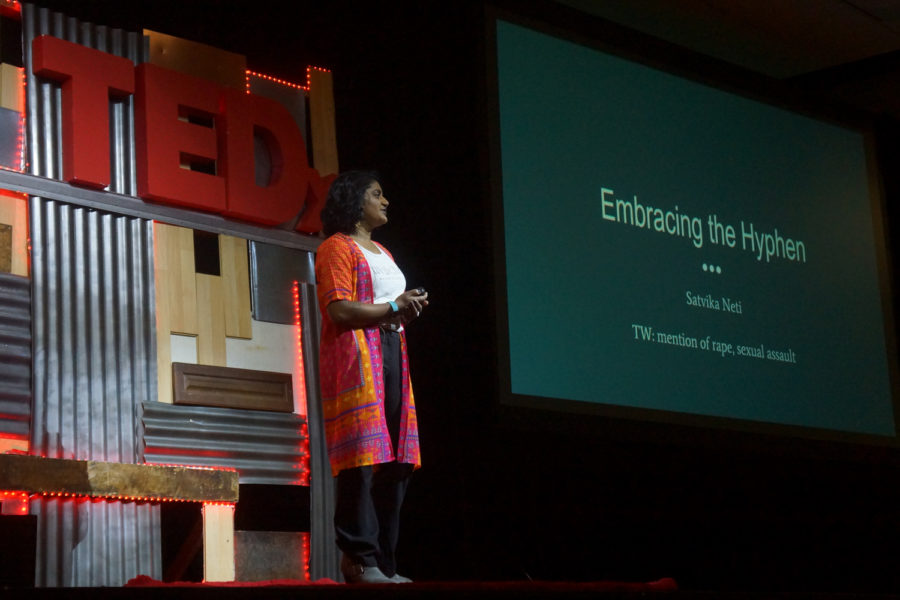After being introduced as a lover of the Constitution, Satvika Neti tripped onto the stage in the William Pitt Union Assembly Room Saturday afternoon, sporting a white “We the people” undershirt.
Neti was one of five speakers at Saturday’s TEDx event, which focused on a single topic — Rethinking. The topics ranged from rethinking how we confront racism, to rethinking what’s possible with prosthetics, to methods of rethinking.
In her talk, titled “Embracing the Hyphen,” Neti discussed how we should rethink how we define our identity. She argued that we should not feel obligated to conform to general labels like “female” or “queer” or “Hispanic,” but instead should hyphenate applicable labels to make a more unique identifier.
But these identifiers are still inadequate even when hyphenated. A few words cannot adequately capture every nuance of someone’s identity or the sum of their lived experiences. And this issue has impacts beyond the words someone uses to describe themselves — it has consequences in local and national political campaigns.
“I am not Indian or American. I am not Indian and American. I am Indian-American,” she said — a hyphenated label that she feels applies to her.
An identity is fundamentally a description of who someone is. It’s a combination of every experience that has somehow shaped someone’s worldview or personality. Labels, on the other hand, describe what someone is. They’re words that highlight particular aspects of someone’s life.
Replacing “who” with “what” makes this question fundamentally different. As an example: I am a cisgender white man, but those three words, even hyphenated, don’t convey who I am — for one, a complete weather geek who gets annoyingly excited when he sees snow in the forecast.
Even Neti herself seemed to doubt that her label of a “queer-brown-immigrant-woman” fit perfectly with who she was.
“My identity is that of oppression,” she said, “but my experience is that of privilege.”
While her four-word description of herself indicates a life of discrimination, she said, it doesn’t convey the fact that she experiences privileges that some others don’t, like an encouraging family and supportive friends.
Though this discussion may seem limited to personal identification, it stretches beyond the individual and into the national political scene. Political campaigns that focus on labels adhere to identity politics.
Identity politics would be better called “label politics.” It’s the focus on labels during political campaigns and the belief that by campaigning on the importance of labels, people who identify with those labels describe will vote for that candidate.
But subscribing to these kinds of politics is flawed because identities are more than just a few words that describe what someone is. Appealing to these labels is less effective — and downright lazier — than appealing to specific shared experiences or identities among voters.
Take the case of Conor Lamb, Democratic U.S. Congressman-elect of Pennsylvania’s 18th Congressional District. Lamb didn’t win in a solidly Republican district by appealing to some label shared by voters. He campaigned on relevant issues like the opioid crisis, health care and labor causes, issues that many voters in the district personally face.
And we can attribute Clinton’s loss in 2016 partially to the failure of identity politics. She relied heavily on forming a coalition of disadvantaged groups to win the election. Despite her attempt, she ended up dropping about 5 percent among Latino, black, millennial and female voters from Obama’s numbers in 2012.
Some may argue that identity politics is effective — after all, African-American voters typically vote Democratic, despite having a wide variety of political beliefs. In the 2016 presidential election, a full 88 percent of black voters voted for Clinton, down from 95 percent in 2012. This could be evidence that identity politics works, since the monolithic black vote is difficult to explain otherwise.
Yet this argument neglects other factors. Since the 1960s, the Democratic party has championed civil rights. And given the Republican party’s hesitance to promote civil rights — like ongoing battles about race and police brutality, evidenced by Saturday’s protest in Oakland — they’re not exactly appealing to black voters.
The monolith is due to not just a shared identity but also a prioritization of civil rights over other issues and a lack of political parties that also support civil rights.
Labels do serve a purpose. They help people find others who are somehow similar to them. They assist in the formation of communities centered around some shared trait, like skin color or cultural heritage or gender. But they don’t belong in the shaping of national policy.
Neti said, “People are complex, and identities are complex.” We shouldn’t try to boil down this complexity for the sake of political convenience.
Brian primarily writes about politics and the environment. Write to Brian at briangentry@pitt.edu.



